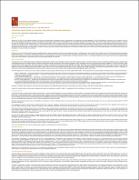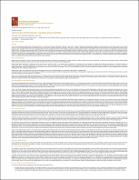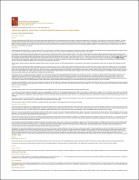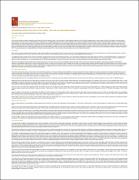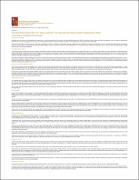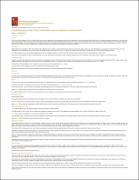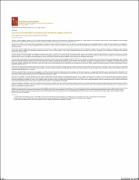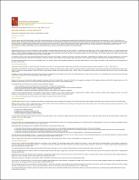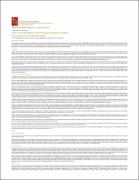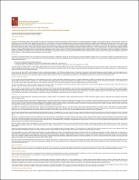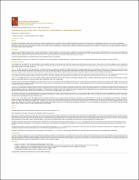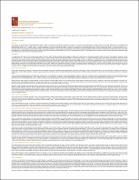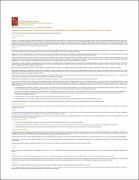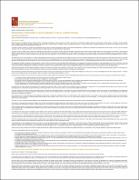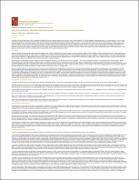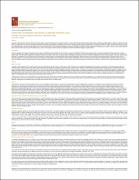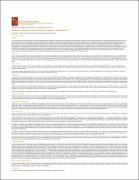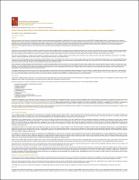Browsing by Issue Date
Now showing items 41-60 of 974
-
Patenting Drugs From 1st January 2005: Implications and Problems
(Uganda Martyrs University, Department of Health Sciences, 2004-08)January the 1st 2005 is a very important deadline for the policy on patented drugs in developing countries: implementation of the agreement concerning paragraph 6 of the Doha Declaration is going to be put into practice, ... -
Agricultural Biotechnology for Developing Countries
(Uganda Martyrs University, Department of Health Sciences, 2004-08)The Food and Agriculture Organization of the United Nations, in "The State of Food and Agriculture 2003-04", examines the potential of agricultural biotechnology to address the current and future needs of the world's poor ... -
Continuing Medical Education: Lessons From Butambala Health Sub-District
(Uganda Martyrs University, Department of Health Sciences, 2004-08)Continuing medical education (CME) is one way of keeping health workers updated with the new developments and new insights in treatment and approaches to health issues. It also helps them remember what is forgotten. This ... -
Integrating Service Delivery in IDP Camps: The Case of Northern Uganda
(Uganda Martyrs University, Department of Health Sciences, 2004-08)The mid-north and parts of eastern Uganda are under siege from the LRA and poor health. There are about 1.6 million people displaced by the LRA living in squalid camps. In these camps, the IDPs are cramped in huts built ... -
The Northern Uganda War: The “Small Conflict” That Became the World’s Worst Humanitarian Crisis
(Uganda Martyrs University, Department of Health Sciences, 2004-08)Acholi land was once known as the breadbasket of Uganda, but it is now the poorest part of the country. More than 900,000 people (over 80%) in the districts of Gulu, Kitgum and Pader are displaced, living in camps and ... -
Planning Health Care For Internally Displaced Persons: Experiences in Uganda
(Uganda Martyrs University, Department of Health Sciences, 2004-08)A significant proportion of Ugandans have at one time or another been forced to flee their homes. In 1997 alone, point prevalence revealed that 2,000,000 persons were displaced and it is estimated that currently about 1.6 ... -
Delivering Health Care to IDPs: Experiences and Challenges in Katakwi District
(Uganda Martyrs University, Department of Health Sciences, 2004-08)There are two broad categories of IDPs in Katakwi district by cause; those displaced by the Karamojong rustlers and those displaced by the Lords Resistance Army (LRA) incursion. Sporadic Karamajong raids started over 50 ... -
The Role of Governments in Ending and Preventing Armed Conflicts
(Uganda Martyrs University, Department of Health Sciences, 2004-08)The war in northern Uganda is ending, or is it? The official Government position is that the war is practically over. And they have evidence for it. Rebel soldiers are surrendering in droves, and the Lord’s Resistance Army ... -
Malaria and DDT: Myths and Facts
(Uganda Martyrs University, Department of Health Sciences, 2004-08)Around the world, about 2,400 million people, in about 100 countries and territories, are still at risk of contracting Malaria. Between 300 and 500 million of them get the disease each year and between 1.1 and 2.7 million ... -
Is DDT Safe? Considering Its Use For Malaria Control in Uganda
(Uganda Martyrs University, Department of Health Sciences, 2004-08)The insecticide DDT has been very successfully used for many years in malaria control programmes around the world. We assess the validity of the allegations that DDT is harmful to human health and the environment and find ... -
Targeting IDPs with Food AID: WFP Assistance in Northern Uganda
(Uganda Martyrs University, Department of Health Sciences, 2004-08)The World Food Programme (WFP) is the United Nations (UN) agency responding to humanitarian emergencies by delivering food aid to vulnerable populations worldwide. The protracted insurgency in northern Uganda resulted in ... -
How Much Do Lab Tests Cost? Analysis of Lacor Hospital Laboratory Services
(Uganda Martyrs University, Department of Health Sciences, 2004-08)An analysis of the laboratory activity costs was done in the Laboratory Department of Lacor Hospital in order to calculate the global cost of each test and to evaluate the cost effectiveness of the service. The study is a ... -
Defining Equity in Health
(Uganda Martyrs University, Department of Health Sciences, 2004-12)For purposes of measurement and operationalisation, equity in health is the absence of systematic disparities in health (or in the major social determinants of health) between groups with different levels of underlying ... -
Innovative Approaches to Community Mobilisation Forimmunisation in Maracha Health Sub District, Arua District
(Uganda Martyrs University, Department of Health Sciences, 2004-12)For years, the vaccination coverage for the indicator doses (DPT3) in Maracha Health Sub-District (HSD) have not reached the 80% target set by the Ministry of health. The Health Sub District management team brainstormed ... -
Measuring Patient Satisfaction in UCMB Health Institutions
(Uganda Martyrs University, Department of Health Sciences, 2004-12)There is growing interest to measure patient satisfaction and collect the views of patients about the services they use. Satisfaction is essential if we have to get people utilize services, comply with treatments and improve ... -
International Recruitment of Health Workers to the UK: A Report for DFID
(Uganda Martyrs University, Department of Health Sciences, 2004-12)Whilst the issue of international migration of health workers is sometimes presented as a one-way linear "brain drain", the dynamics of international mobility, migration and recruitment of health workers re complex, covering ... -
Inequalities in Medical Research and Development: The Case of Neglected Diseases
(Uganda Martyrs University, Department of Health Sciences, 2004-12)According to the World Health Report 2002, preventable or treatable infectious and parasitic diseases are the primary causes of death worldwide. The limited availability of appropriate drugs to treat these diseases is a ... -
Export Health Workers? For Uganda, An Indecent Proposal Until…
(Uganda Martyrs University, Department of Health Sciences, 2004-12)This paper challenges the decision by the Government of Uganda to export health workers to developed countries. It argues that while the Ugandan National Health Policy emphasises strengthening the numbers of health personnel ... -
Bhopal 20 Years on: Globalization and Corporate Responsibility
(Uganda Martyrs University, Department of Health Sciences, 2004-12)The year 2004 marks the 20th anniversary of the worst industrial disaster in human history. Some 40 tonnes of methyl isocyanate leaked from a tank at the Union Carbide Corporation (UCC) chemical pesticide plant in Bhopal, ... -
Reduction of User Fees in the Private-Not-For-Profit Hospitals in Uganda: Implications for Equity and Sustainability
(Uganda Martyrs University, Department of Health Sciences, 2004-12)While the reduction of user fees was not seriously contested as a big step towards equity and evidence of faithfulness to their mission, many private-not-for-profit (PNFP) hospitals dragged their feet in implementing these ...


